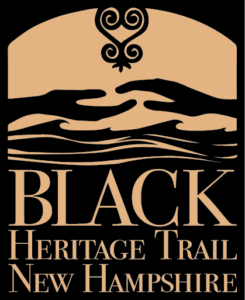In recognition of Black History Month, we interviewed JerriAnne Boggis, Executive Director of Black Heritage Trail of New Hampshire. You can learn more about this organization and access their resources at blackheritagetrailnh.org.
Tell us a little bit about your organization’s mission.
The Black Heritage Trail of New Hampshire (BHTNH) is a statewide nonprofit organization dedicated to recovering and celebrating New Hampshire’s rich but often overlooked Black history. Founded seven years ago, BHTNH evolved from the Portsmouth Black Heritage Trail (PBHT), which has illuminated the African American experience in Portsmouth for over thirty years.
Our mission is to celebrate and honor New Hampshire’s inclusive history, highlighting stories that have remained hidden for too long. Through research, public programs, and historic preservation, we engage communities by making Black history visible, relevant, and accessible.
At the heart of our work is a commitment to fostering meaningful dialogue on race, diversity, and inclusion. We believe that by sharing corrective narratives, we can break down barriers of misunderstanding, reduce racial anxiety, and inspire deeper connections among people of all backgrounds.
Our Signature Programs are designed to educate, engage, and empower:
- Elinor Williams Hooker Tea Talks – A series of participatory panel discussions exploring New Hampshire’s Black history and African American culture.
- Juneteenth Celebrations – A weeklong series of events commemorating the end of slavery in the U.S., featuring performances, lectures, and community gatherings.
- Frederick Douglass Reading – A statewide public reading of Douglass’s seminal speech, What to the Slave is Your Fourth of July?, fostering reflection on the ongoing struggle for justice.
- Black New England Conference – An annual gathering of scholars, artists, activists, and community members discussing historical and contemporary Black experiences in New England and beyond.
- Historic Marker Project – A statewide initiative to make Black history more visible through historic markers. With 23 markers already in Portsmouth and additional markers in cities and towns across New Hampshire—including Exeter, Milford, Warner, Hancock, Dover, Andover, Derry, Dunbarton, Jaffrey, Manchester, Nashua, Windham, and two in Kittery, ME —we aim to expand this network by adding at least five new markers each year, creating a visible trail that tells a fuller, more inclusive history.
In addition to our major programs, we offer guided historical tours in Portsmouth, Milford, Exeter, Dover, Hancock, and Warner. These tours allow visitors to follow in the footsteps of history and explore the deep-rooted Black presence in New Hampshire.
Through these initiatives, BHTNH strives to ensure that New Hampshire’s Black history is preserved and actively integrated into the broader narrative of the state’s heritage.
What does your organization offer to professionals in the Greater Concord area?
The Black Heritage Trail of New Hampshire (BHTNH) actively engages professionals in the Greater Concord area by providing educational resources, discussions, and programming that foster a deeper understanding of New Hampshire’s Black history and contemporary social justice issues.
We have partnered with institutions such as UNH Law School and the Concord Public Library to deliver presentations and facilitated discussions on Black communities’ historical and contemporary experiences in New Hampshire. These events provide professionals valuable historical context, cultural competency insights, and tools for fostering inclusivity in their workplaces and communities.
Additionally, we offer an audio tour of Concord’s Black history sites, accessible via our YouTube channel, allowing individuals to explore the city’s rich and often-overlooked Black heritage at their own pace.
In addition to these initiatives, BHTNH partners with local businesses and organizations to create tailored programs and discussions on race, diversity, and social justice, assisting professionals in engaging in meaningful conversations and fostering more inclusive environments.
Can you share a little bit about yourself, and your connection to this work?
Twenty years ago, like most people in New Hampshire, I knew nothing about the state’s Black history—it was not visible, it was not told. As an immigrant, I understood what it means to be in the majority and see the reflection of your story around you, and I also know what it feels like to be “othered” and “invisible.” It is a perspective that shaped my journey into this work.
That journey began in 2002 when I discovered that Harriet Wilson, a native of Milford, New Hampshire, was the first African American to publish a novel in English. Learning about her work and her life changed everything. Within three years, I formed a nonprofit to raise awareness of her incredible achievement. I commissioned a memorial in her honor, which turned out to be the first statue in our state to honor a person of color.
Through this experience, I discovered a fundamental truth: belonging ignites engagement. Before Harriet, I was disconnected from the town I now call home. After discovering Wilson’s story, I found roots in Milford. Once we feel that connection, we invest, participate, and break the cycle of indifference.
This is why I am passionate about the work of the Black Heritage Trail of New Hampshire. We continue the legacy of Valerie Cunningham, whose groundbreaking research uncovered a complex and substantial 400-year Black history in the state. Today, BHTNH is expanding on her work statewide.
By celebrating resilience and dismantling stereotypes, we foster understanding, reduce racial anxiety, and create bridges between communities. As Maya Angelou said, “When I engage in dialogue with you, I change. When you engage in dialogue with me, you change. We change each other.” That’s the “we” work I’m committed to—and I look forward to the journey ahead.
February is Black History Month; why is this date important to you?
Honestly, I wish we didn’t need a Black History Month—because Black history is American history. The stories we share aren’t just about Black people for one designated month; they are essential chapters of our collective national story.
Yet, without this recognition, I fear these narratives will continue to be overlooked, ignored, or forgotten. Until we truly embrace an inclusive history, one that honors all communities as an integral part of the American experience, I will continue to champion, amplify, and celebrate these stories.
Black History Month is not just about remembrance; it’s about visibility, education, and transformation. It’s a call to action—a reminder that history is still being written and that we each have a role in shaping it.

